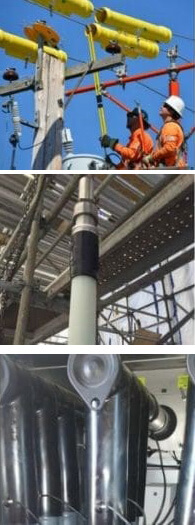Testing Insulating Gloves | Guide to Safe Use & Care for Electrical Gloves
Published 20 Jul 2022

Electrical Insulating Rubber Gloves
Testing Insulating Gloves
Guide To Safe Use of Classes 00, 0, 1, 2, 3 and 4 Electrical Gloves
Improper use of electrical rubber insulating gloves can be a matter of life and death.
Get them retested regularly to make sure that they are still electrically safe.
Treat your rubber insulating gloves well and they can last a long time. The testing of insulating gloves will help to prevent failure which could lead to electrical shock if the surface integrity has been comprised by “wear and tear”.
As Main UK Stockists for the CATU Electrical range of insulating gloves Thorne & Derrick regularly are requested to provide care and maintenance advice to ensure gloves provide adequate and ongoing electrical safety and protection to the wearer.
Any Brand of Insulating Glove can be tested. Here are some examples:
- CATU
- Regeltex
- Honeywell Salisbury
- Polyco
- Clydesdale (Novax)

Electrical Insulation Tests For Gloves
| Class Of Gloves | Maximum Voltage Use AC DC | Test Voltage AC Proof | Test Voltage AC Withstand |
| 00 | 500V ac | 750V dc | 2.5kV | 5kV |
| 0 | 1000V ac | 1500V dc | 5kV | 10kV |
| 1 | 7500V ac | 11250V dc | 10kV | 20kV |
| 2 | 17000V ac | 25500V dc | 20kV | 30kV |
| 3 | 26500V ac | 39750V dc | 30kV | 40kV |
| 4 | 36000V ac | 54000V dc | 40kV | 50kV |
Special Properties Of Gloves
| Special Property Of Insulating Glove | Category Marking Code |
| Acid Resistance | A |
| Oil Resistance | H |
| Ozone Resistance | Z |
| Acid, Oil & Ozone Resistance | R |
| Extreme Low Temperature | C |
1 – Expiration Date
Insulating rubber gloves have no expiry date and may be used as long as they comply with the periodic inspection.
2 – Periodic Inspection
Class 00 and Class 0 Gloves
- Verification regarding air leaks and a visual inspection
- However, a routine dielectric test may be performed at the owner’s request
Class 1, 2 , 3 and 4 Gloves
- Verification regarding air leaks and and a visual inspection
- Verification via a dielectric test to verify electric properties
- Every 6 months to be re-tested, since they were first worn
- Every 12 months, even those held in storage and not worn to be re-tested

Testing Insulating Gloves | Glove Markings
3 – Field inspection & Stock
Do not confuse the periodic inspection with the inspection before each use. Together with the periodic inspection, it is strongly recommended that a visual inspection of the gloves is carried out before each use.
It is important to store the gloves in their UV-Resistant polythene bag and keep the gloves away from light, heat, and ozone. Ideally, the user should use our pneumatic tester to inflate the gloves for a good visual inspection and keep the gloves in our polypropylene store box for both transportation and storage.
4 – Special Properties
Gloves that pass the special properties (acid, oïl, ozone, very low temperature) are not resistant to chemicals. The test is to guarantee electrical protection in case of accidental contacts. After completing the electrical work, it is recommended to replace the contaminated gloves.
A periodic dielectric inspection service
- On receipt of your gloves to our premises, the gloves and sleeves are documented and then washed and dried.
- They are then visually inspected by our technicians, using inflation equipment.
- The next stage is electrical testing. Test equipment is used and tests are carried out according to the correct voltage for the class of glove. After the electrical testing has been completed they are again inflated and visually inspected. The gloves are then stamped and packed for return.
- Documentation accompanies the gloves and sleeves through all stages of testing and any failures are recorded. Any glove that fails will be destroyed. If the customer wishes, failures can be replaced with new items from our stocks.
Arc Flash PPE & Electrical Safety
Main UK Stockists & Distributors of Electrical Safety Products
Thorne & Derrick provide Electrical Safety Equipment to substation engineers, cable jointers, overhead linesmen and utility workers with PPE and electrical safety equipment including insulating gloves, voltage detectors, insulating matting and portable earthing to ensure worker safety when carrying out maintenance on LV-HV switchgear, substations, cables and electrical equipment.





